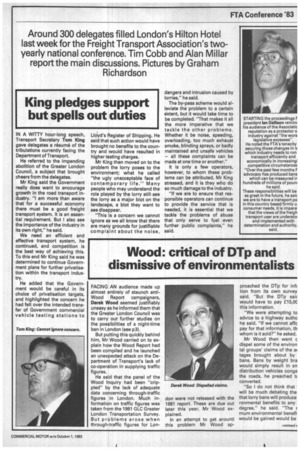King pledges Support but spells out duties
Page 59

If you've noticed an error in this article please click here to report it so we can fix it.
IN A WITTY hour-long speech, Transport Secretary Tom King gave delegates a résumé of the tribulations currently facing the Department of Transport.
He referred to the impending abolition of the Greater London Council, a subject that brought cheers from the delegates.
Mr King said the Government really does want to encourage growth in the road transport industry. "I am more than aware that for a successful economy there must be a good freight transport system. It is an essential requirement. But I also see the importance of the industry in its own right," he said.
We need an efficient and effective transport system, he continued, and competition is the best way of achieving this. To this end Mr King said he was determined to continue Government plans for further privatisation within the transport industry.
He added that the Government would be careful in its choice of privatisation targets, and highlighted the concern he had felt over the intended transfer of Government commercial vehicle testing stations to Lloyd's Register of Shipping. He said that such action would have brought'no benefits to the country and would have resulted in higher testing charges.
Mr King then moved on to the problern the lorry poses to the environment; what he called "the ugly unacceptable face of conteMporary life." Many people who may understand the role played by the lorry still see the lorry as a major blot on the landscape, a blot they want to see disappear.
"This is a concern we cannot ignore as we all know that there are many grounds for justifiable complaint about the noise, dangers and intrusion caused by lorries," he said.
The by-pass scheme would alleviate the problem to a certain axtent, but it would take time to be completed. "That makes it all the more imperative that we tackle the other problems. Whether it be noise, speeding, overloading, too much exhaust smoke, blinding sprays, or badly maintained and unsafe vehicles — all these complaints can be made at one time or another."
It is only a few operators, however, to whom these problems can be attributed, Mr King stressed, and it is they who do so much damage to the industry.
"If we are to ensure that responsible operators can continue to provide the service that is needed, it is essential that we tackle the problems of abuse that only serve to fuel even further public complaints," he said.




































































































